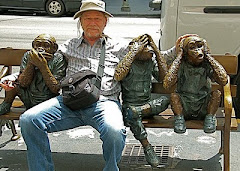 |
| Monhegan in the evening golden hour CC Jean Stimmell 7/3/19 |
Friday, July 5, 2019
Jumping Free
I haven’t written much lately, but it has been of no concern. I’ve been happy to tend the garden, build my waterfall, and take walks in the ever-shifting kaleidoscope of spring.
But spending a week on Monhegan Island, a magnificent little gem 12 miles off the coast of Maine without the distractions of modern life – without TV, Twitter or social media – was a revelation to me.
Without conscious awareness, I had become like the frog in the proverbial pot on the stove who didn’t notice the heat had slowly been ratcheted up until it was too late to jump, and he was cooked.
Luckily, unlike the proverbial frog, I jumped out in time. And landed on Monhegan to join close friends.
Soon after arriving here, my mind cleared, like the sun breaking through morning fog: I felt viscerally alive – I guess like a groundhog waking up from a long winter’s hibernation.
It came to me how much our country is, indeed, a giant roiling pot, a cauldron rife with tribal culture wars and incessant fear mongering , all conspiring to boil away our essence.
On the island, without the restricting leash of conventional society, I found myself becoming disoriented and lost. That’s not necessarily a bad thing: Getting lost can be a liberating experience as Rebecca Solnit illustrated in her classic book, “Field Guide to Getting Lost.”
I identified with the Thoreau quote in her book about how only when we become lost “do we appreciate the vastness and strangeness of nature. Not till we have lost the world, do we begin to find ourselves, and realize where we are and the infinite extent of our relations.”1
As I became increasingly lost, I saw how in our culture, our left brain has been worshipped to such an extent, it has become our supreme idol, the new god of modernity. By privileging our left brain, we have become, cognitive, computer-like creatures who can calculate anything that can be commodified for pleasure and gratification – or to gain power over others.
But, in the process, we have forsaken our right brains, the seat of our spiritual souls; we have forgotten, how to inhabit our bodies and be grounded with a sense of place, prerequisites to rest comfortably in the bosom of Mother Earth.
As I was musing, it struck me why my writing has tailed off. It is because words in my life have become optional.
Rebecca Solnit describes having the same epiphany during a desert meditation: she was enveloped in “a kind of humming silence in which solitude seems as natural to your species as to any other, words strange rocks you may or may not turn over.”2
Day after day, watching the sun rise out of the ocean, reconnected me to what is really real: the mythic powers of the earth and the cosmos beyond: It is the deep intelligence of Mother Earth that regulates the tide, wind, and climate which will determine our future– or if we will even have one.
It is that deep intelligence, beyond the power of any computer, which choreographs the movement of giant flocks of migrating birds, gyrating and whirling in ever-changing patterns, flying millimeters from each other, but never touching:
The same deep intelligence that guides a child’s joy as she leaps with abandon from one rock to another on an island paradise to celebrate the end of a perfect summer day.
xxx
–––––––––––––––––––––––––––––––––––––
1 Solnit, Rebecca. A Field Guide to Getting Lost (pp. 14-15). Penguin Publishing Group. Kindle Edition.
2 Solnit, Rebecca. A Field Guide to Getting Lost (p. 131). Penguin Publishing Group. Kindle Edition.
Subscribe to:
Posts (Atom)

















